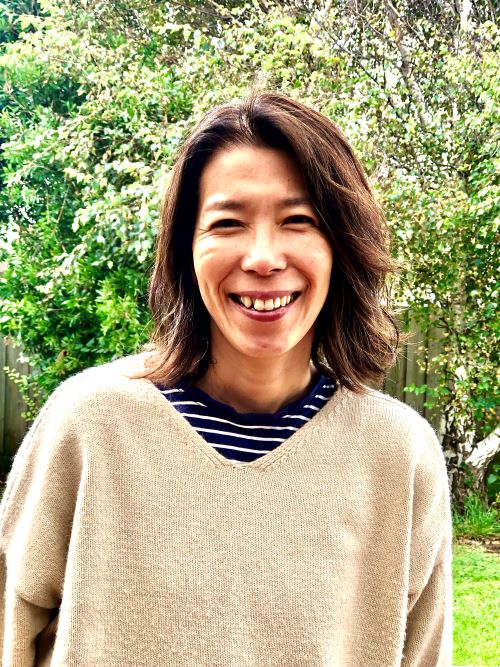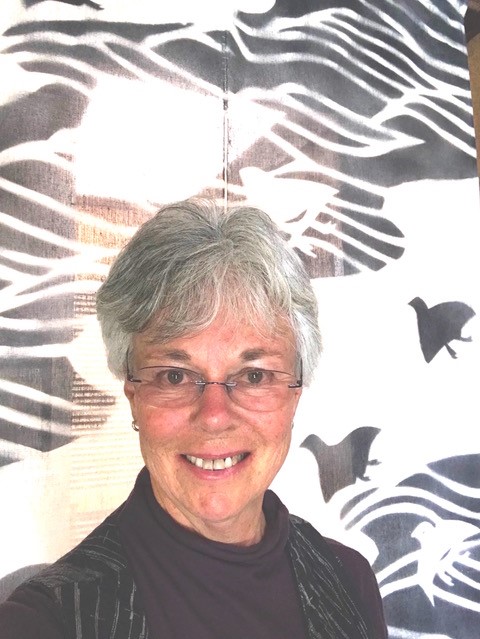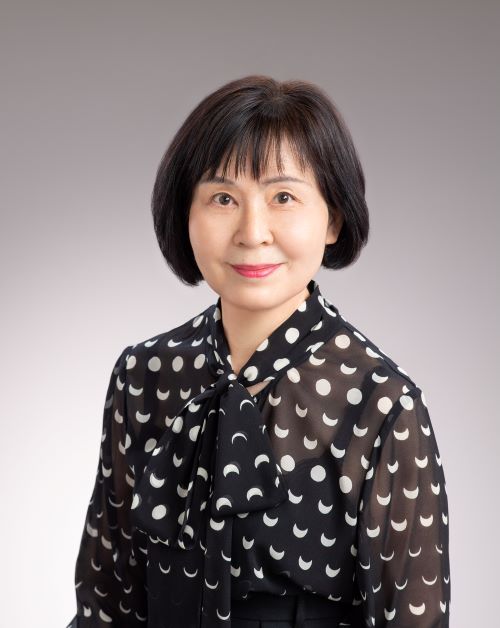Keynote Speakers
Please find below more details about our Keynote Speakers for the Border-Crossing Australian and Japanese Literature Symposium.
Iwaki Kei
 Women Who ‘Slice Open’ Language With ever-accelerating globalization, changes to the faces of the characters in my book, Sayōnara, orenji (Farewell, My Orange), are now taking place ten years after its publication. As mobility intensifies around the world, more and more people are required to replace their own language with something else.
Women Who ‘Slice Open’ Language With ever-accelerating globalization, changes to the faces of the characters in my book, Sayōnara, orenji (Farewell, My Orange), are now taking place ten years after its publication. As mobility intensifies around the world, more and more people are required to replace their own language with something else.
Why do people abandon their first language and choose another? What compelling desire arises to replace the pain of forsaking one’s mother tongue? I look forward in the brief time available to exploring these issues with my audience.
Delivered in Japanese and simulatenously interpreted into English.
Bio
Born in Osaka in 1971, Iwaki Kei graduated from university before leaving Japan for Australia. Her debut novel Sayōnara, orenji (Farewell, My Orange) won the Dazai Osamu Prize in 2013 and the 8th Ōe Kenzaburō Prize in 2014. Since that time, Iwaki has continued writing Japanese language novels on the theme of ‘people and language’. Her works include Masato, awarded the 32th Tsubota Jōji Literary Prize, Matt and Saundo Posuto (Sound Post). Her seventh novel M is scheduled for publication by Shūeisha in June 2023. She currently resides in Victoria, Australia.
Meredith McKinney
Crisscrossing Boundaries
 The ideal of translation is to bring together two languages and two worlds, so neatly that the seam is invisible. But it is at the jagged intersection of the two that the true work of translation happens, and where its real interest lies. In this talk I want to examine two different experiences of that place of intersection, and what they taught me about the difficulties and possibilities of translation's attempt to cross boundaries.
The ideal of translation is to bring together two languages and two worlds, so neatly that the seam is invisible. But it is at the jagged intersection of the two that the true work of translation happens, and where its real interest lies. In this talk I want to examine two different experiences of that place of intersection, and what they taught me about the difficulties and possibilities of translation's attempt to cross boundaries.
One is my experience of translating Iwaki Kei's Australian novel Sayōnara Orenji (published in English as Farewell, my Orange), a work whose very theme is the problematic experience of cultural and linguistic boundaries. The other was my early experience of co-translating the poetry of Judith Wright, a poet whose work is deeply rooted in the Australian landscape and the English lyrical tradition. In their very different ways, these two experiences gave me fresh insights into the challenges, limitations and possibilities of translating across the boundaries between Japanese and Australian literature.
Delivered in English and simultaneously interpreted into Japanese.
Bio
Meredith McKinney is a translator of Japanese literature who lives near Braidwood in the southern tablelands of New South Wales. She has published more than 20 translations of literary works, ranging from the earliest Japanese poetry to contemporary fiction. Her translations for Penguin Classics include The Pillow Book by Sei Shōnagon, and Kokoro and Kusamakura by Natsume Sōseki. Her most recent publication is Gazing at the Moon, translations of the poetry of the medieval poet-monk Saigyō, and she is currently working on a translation of Towazugatari, the 14th century memoir of the imperial concubine and later wandering nun Lady Nijō, for Penguin Classics. In 2018 Meredith's translation of Iwaki Kei's novel Sayōnara Orenji was published by Europa Editions. Meredith lived and worked in Japan for 20 years before returning to Australia in 1998, and is currently Honorary Associate Professor at the Australian National University. She is the daughter of Australian poet and environmental activist Judith Wright, whose work she has co-translated into Japanese.
Arimitsu Yasue
 Finishing the “Project of Translating Australian Contemporary Novels into Japanese.” I am a member of the Australian Literary Society of Japan, and participant in the “Project of Translating Australian Contemporary Novels into Japanese.” This project was initiated by Gendai-Kikakushitsu publishers in 2012 with the publication of a Japanese translation of David Malouf’s Remembering Babylon, which was the first book in the series. Gendai-Kikakushitsu had already published A Collection of Australian Contemporary Short Stories—Which Reflect the Multicultural Society of Australia in 2008, with the impetus for this coming in 2001 from Prof. Kate Darian-Smith and myself. Since we both understood the need for teaching materials designed to introduce Australian society and culture to university students in Japan, we decided to translate 16 Australian contemporary short stories into Japanese. When that collection was well accepted by the Japanese readers, the publisher suggested producing ten Australian contemporary novels in Japanese translation in ten years. We formed a committee to select the novels and began the translations. In this lecture, I will discuss how we selected books, aspects of the translation process and the public responses when the translations appeared. Most importantly, I will outline the fruits of our efforts, and the meaning of introducing Australian literature to Japanese readers.
Finishing the “Project of Translating Australian Contemporary Novels into Japanese.” I am a member of the Australian Literary Society of Japan, and participant in the “Project of Translating Australian Contemporary Novels into Japanese.” This project was initiated by Gendai-Kikakushitsu publishers in 2012 with the publication of a Japanese translation of David Malouf’s Remembering Babylon, which was the first book in the series. Gendai-Kikakushitsu had already published A Collection of Australian Contemporary Short Stories—Which Reflect the Multicultural Society of Australia in 2008, with the impetus for this coming in 2001 from Prof. Kate Darian-Smith and myself. Since we both understood the need for teaching materials designed to introduce Australian society and culture to university students in Japan, we decided to translate 16 Australian contemporary short stories into Japanese. When that collection was well accepted by the Japanese readers, the publisher suggested producing ten Australian contemporary novels in Japanese translation in ten years. We formed a committee to select the novels and began the translations. In this lecture, I will discuss how we selected books, aspects of the translation process and the public responses when the translations appeared. Most importantly, I will outline the fruits of our efforts, and the meaning of introducing Australian literature to Japanese readers.
Delivered in Japanese and simultaneously interpreted into English.
Bio
Arimitsu Yasue is Professor Emeritus, Doshisha University in Kyoto. She studied at the Australian National University where she received her master’s degree in 1985 for “Finding a Place: Landscape and the Search for Identity in the Early Novels of Patrick White.” She taught English and Australian literature at Tezukayama Gakuin University in Osaka (1988–1995), and Doshisha University in Kyoto (1995–2014). Before departing for Australia, she had translated a number of Australian and New Zealand short stories into Japanese. Returning to Japan, she co-edited and translated a selection of Australian short stories, published as Diamond Dog: A Collection of Contemporary Australian Short Stories (2008). These reflected the multicultural features of contemporary Australian society. She is currently working on the “Ten-Year-Project” involving the translation of contemporary Australian novels. Seven novels have been published to date, with the eighth scheduled to appear very soon. Besides producing translations, Professor Emeritus Arimitsu is the author of the monograph, Australian Identity: Struggle and Transformation in Australian Literature in 2003 (awarded Australia-Japan Foundation Sir Neil Currie Special Prize in 2003), and has co-edited Contemporary Australian Studies: Literature, History, Film and Media Studies in a Globalizing Age (2017). She was the president of the Australian Studies Association of Japan (2010–2013), and the president of the Australia New Zealand Literary Society of Japan (2014–2018).
Iwaki Kei
「言葉を捌(さば)く女たち」
 グローバル化が急速に進む中、刊行十年を経て、拙著『さようなら、オレンジ』の登場人物たちも別の顔を見せはじめました。地球レベルでの人々の移動が活発化するに伴い、自らの言語を取り替えなければならない人たちもさらに増えはじめています。
グローバル化が急速に進む中、刊行十年を経て、拙著『さようなら、オレンジ』の登場人物たちも別の顔を見せはじめました。地球レベルでの人々の移動が活発化するに伴い、自らの言語を取り替えなければならない人たちもさらに増えはじめています。
人が新たな言語を選び、自分の言語を手放すのはなんのためなのか。その痛みと引き換えに芽生える切実な願いとはどのようなものなのか。
短いひとときですが、皆さまと共に考えてみたいと思います。
(発表言語:日本語、日英同時通訳あり)
岩城けい
1971年大阪生まれ。大学卒業後、単身渡豪。2013年『さようなら、オレンジ』で太宰治賞を受け、小説家デビュー。2014年、同作で第8回大江健三郎賞を受賞。以来「人間と言語」をテーマに執筆を続ける(使用言語は日本語)。その他の著書に『Masato』(第32回坪田譲治文学賞)、『Matt』『サウンド・ポスト』など。今年六月に第七作となる『M』(集英社)を刊行予定。オーストラリア・ヴィクトリア州在住。
Meredith McKinney
境界を越えて
 翻訳の理想のかたちとは、二つの言語と二つの世界を一つに合わせ、その継ぎ目が見えないようにすることでしょう。しかし、本当の翻訳が生じるのはこれら二つのざらざらとした交差領域であり、そこに翻訳作品の本当の面白さが存在します。講演では、こうした交差領域における私自身の二つの異なる経験を分析し、境界を越えようと試みる翻訳の難しさと可能性についてその経験が何を教えてくれたのかを考察します。
翻訳の理想のかたちとは、二つの言語と二つの世界を一つに合わせ、その継ぎ目が見えないようにすることでしょう。しかし、本当の翻訳が生じるのはこれら二つのざらざらとした交差領域であり、そこに翻訳作品の本当の面白さが存在します。講演では、こうした交差領域における私自身の二つの異なる経験を分析し、境界を越えようと試みる翻訳の難しさと可能性についてその経験が何を教えてくれたのかを考察します。
一つの経験は、オーストラリアを舞台にした岩城けい著『さようなら、オレンジ』の翻訳に関するものです。この小説のテーマそのものが、文化的・言語的境界における複雑な経験を取り上げています。もう一つは、ジュディス・ライトの詩を日本語に共訳した翻訳者としての初期の経験です。ライトの詩は、オーストラリアの風景と英語抒情詩の伝統に深く根差しています。これら二つの経験により、二つの異なる方法で、日本とオーストラリアの文学の境界を越えて翻訳するという挑戦、その限界、そして可能性への新たな洞察を得ることになりました。
(発表言語:英語、英日同時通訳あり)
メレディス・マッキニー
日本文学翻訳者。ニューサウスウェールズ州南部高地のブレイドウッド近郊在住。古典和歌から現代小説まで、20を超える文学作品の英語訳を手がける。ペンギン・クラシックスの翻訳書に清少納言のPillow Book(枕草子)、夏目漱石のKokoro(こころ)およびKusamakura(草枕)など。最近の出版に、中世の僧侶で歌人の西行が詠んだ和歌を翻訳編纂したGazing at the Moonがある。現在、宮廷女房でのちに尼となり漂白の旅に出た後深草院二条の14世紀の自伝的回想記『とはずがたり』を翻訳しており、ペンギン・クラシックスより刊行予定。
2018年には、岩城けい著『さようなら、オレンジ』の翻訳をEuropa Editions社から出版。
マッキニーは、20年間日本に滞在したのち、1998年オーストラリアに帰国。現在、オーストラリア国立大学名誉准教授。母は、詩人で環境活動家のジュディス・ライトで、その作品の日本語への共訳も手がけた。
Arimitsu Yasue
「オーストラリア現代文学傑作選」の翻訳を終えて
 私は、「オーストラリア・ニュージーランド文学会」が1979年に発足されて以来の会員で、長年、オーストラリア文学研究に携わって参りました。その間、学会ではいろいろな活動を行ってきましたが、2012年に開始された「オーストラリア現代文学傑作選」の翻訳プロジェクトに深く関わってきました。このプロジェクトは東京の出版社、現代企画室の発案によるもので、オーストラリアに出自をもつ、あるいは同国で活動する現代作家の文学作品を、10年かけて1年に1作のペースで紹介していくというものでした。ディヴィッド・マルーフ著『異境』(Remembering Babylon) に始まり、本年の4月に刊行のアレクシス・ライト著短編『地平線の叙事詩』(Odyssey of Horizon)で終了することになります。当初予定した10冊には至りませんでしたが全8冊の刊行となります。
私は、「オーストラリア・ニュージーランド文学会」が1979年に発足されて以来の会員で、長年、オーストラリア文学研究に携わって参りました。その間、学会ではいろいろな活動を行ってきましたが、2012年に開始された「オーストラリア現代文学傑作選」の翻訳プロジェクトに深く関わってきました。このプロジェクトは東京の出版社、現代企画室の発案によるもので、オーストラリアに出自をもつ、あるいは同国で活動する現代作家の文学作品を、10年かけて1年に1作のペースで紹介していくというものでした。ディヴィッド・マルーフ著『異境』(Remembering Babylon) に始まり、本年の4月に刊行のアレクシス・ライト著短編『地平線の叙事詩』(Odyssey of Horizon)で終了することになります。当初予定した10冊には至りませんでしたが全8冊の刊行となります。
当講演において、このプロジェクトの前に刊行した現代オーストラリア短編集、『ダイヤモンドドッグ』についても言及し、当現代文学傑作選がどのような経緯で始まり、どのような方法で作品を選び、また翻訳を行っていったかについてお話し、出版後の作品への反応、また日本における現在の翻訳事情などについて述べていきます。そして海外文学が数多く紹介されている今日、日本にオーストラリア文学を紹介する意味について、考察します。
(発表言語:日本語、日英同時通訳あり)
有満保江
同志社大学名誉教授。オーストラリア国立大学にて修士号取得(オーストラリア政府機関豪日交流基金、大学院奨学生として留学)。帰国後、帝塚山学院大学(1988 – 1995)、同志社大学(1995 – 2014)にて教鞭をとる。留学前からオーストラリア文学短編集に翻訳を掲載、帰国後は『ダイヤモンド・ドッグ―《多文化を映す》現代オーストラリア短編小説集』共・編訳 (現代企画室、2008)を出版、現在は、「現代オーストラリア文学傑作選」(現代企画室主催)と題する10年翻訳プロジェクトを実施中である。2012年~2022年に7冊の小説の翻訳を出版し、第8冊目は近々出版される予定です。著書としては、『オーストラリアのアイデンティティ―文学にみるその模索と変容』(東京大学出版会、2003)<豪日交流基金サー・ニールカリー賞特別賞受賞>; “Nation and Literature: Literary Possibilities in a Multicultural Society” was published in Wolfgang Zach/Ulrich Pallua (eds) Racism, Slavery, and Literature (2010); “Richard Flanagan’s The Narrow Road to the Deep North and Matsuo Basho’s Oku no Hosomichi,” Coolabah No.21, Australian Studies Centre, University of Barcelona (2017); Contemporary Australian Studies: Literature, History, Film and Media Studies in a Globalizing Age 共・編著 (音羽書房・鶴見書店、2017) などがある。オーストラリア学会会長 (2010–2013)、日本オーストラリア・ニュージーランド文学会会長 (2014–2018)を務める。
